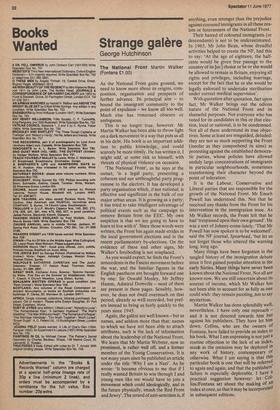Strange gaiere
George Hutchinson
The National Front Martin Walker (Fontana .00)
As the National Front gains ground, we need to know more about its origins, composition, organisation and prospects of further advance. Its principal aim — to hound the immigrant community to the point of expulsion — we know all too well. Much else has remained obscure or ambiguous.
This is no longer true, however. Mr Martin Walker has been able to throw light on a dark movement in a way that puts us all in his debt. His book is an important addition to public knowledge,, and could scarcely be more timely. He has written it, I might add, at some risk to himself, with threats of physical violence on occasion.
'The National Front', as he says at the outset, 'is a legal party, presenting a coherent and not unthoughtful party programme to the electors. It has developed a party organisation which, if not national, is effective and significant in the bulk of our major urban areas. It is growing as a party; it has tried to take intelligent advantage of political events such as the campaign to remove Britain from the EEC. My own suspicion is that we are going to have to learn td live with it'. Since those words were written, the Front has again made strides in the local government .elections and in the recent parliamentary by-elections. On the evidence of these and other signs, Mr Walker's foreboding is not misplaced.
As you would expect, he finds the Front's antecedents in the Fascist movement before the war, and the familiar figures in the English pantheon are brought forward one by one: Sir Oswald Mosley, Mr Jeffrey Hamm, Admiral Domville — most of them are present in these pages. Sensibly, however, he does not dwell overmuch on that period, already so well recorded, but prefers instead to bring us fairly quickly to the years since 1945.
Again, the galere are well known — but as names, and seldom more than that: names to which we have not been able to attach attributes, such is the lack of information about the leadership of the National Front. We learn that Mr Martin Webster, now so prominent, is rather well off, and a former member of the Young Conservatives. It is not many years since he published an article under the title 'Why I am a Nazi'. As he wrote: `It became obvious to me that if I really wanted Britain to win through I and young men like me would have to join a movement which could ideologically, and in the future physically, smash the Red Front and Jewry'. The strand of anti-semitism is, if anything, even stronger than the prejudice against coloured immigrants in all these zealots or forerunners of the National Front.
Their hatred of coloured immigrants (or descendants) is not to be underestimated. In 1963, Mr John Bean, whose dreadful activities helped to create the NF, had this to say: 'At the age of eighteen, the halfcaste would be given free passage to the country of its [sic] choice or he or she would be allowed to remain in Britain, enjoying all rights and privileges, including marriage, except for the fact that he or she would be legally enforced to undertake sterilisation under correct medical supervision'.
With quotation after quotation, fact upon fact, Mr Walker brings out the odious nature of the National Front and its shameful purposes. Not everyone who has voted for its candidates in this or that election, local or national, is to be condemned. Not all of them understand its true objectives. Some at least are misguided, deluded: they are not so much supporting the Front (insofar as they comprehend its aims) as protesting against the established democratic parties, whose policies have allowed unduly large concentrations of immigrants in particular neighbourhoods, sometimes transforming their character beyond the point of toleration.
It is the Labour, Conservative and Liberal parties that are responsible for the growth of the National Front. Mr Enoch Powell has understood this. Not that he received any thanks from the Front for his intervention in the immigration issue. As Mr Walker records, the Front felt that he had 'trespassed upon their own ground'. He was a sort of Johnny-come-lately. 'That Mr Powell has now spoken is to be welcomed', said the NF journal, Spearhead, 'but let us not forget those who uttered the warning long, long ago.'
Many things have been forgotten in the tangled history of the immigration debate since it first gained popular, attention in the early Sixties. Many things have never been known about the National Front. Not all are known now. We are still uncertain about its sources of income, which Mr Walker has not been able to account for as fully as one could wish: they remain puzzling, not to say mysterious.
Martin Walker has done splendidly well, nevertheless. I have only one reproach — and it is not directed towards him but against his publishers. They have let him down. Collins, who are the owners of Fontana, have failed to provide an index to his book. What I am expressing is not just a routine objection to the lack of an index, much as the omission may be deplored in any work of history, contemporary 01 otherwise. What I am saying is that this particular book is one that will be referred to again and again, and that the publishers' failure is especially deplorable. I have practical suggestion however: let Collins/Fontana set about the making of an index at once, so that it may be incorporated in subsequent editions.


































 Previous page
Previous page